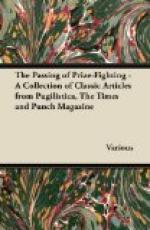* * * * *
England, February, 1917.—“The great loan land.”
* * * * *
[Illustration: THE LAST THROW.]
* * * * *
ESSENCE OF PARLIAMENT.
Monday, February 12th.—Question-time, which towards the end of last Session was extended by a quarter-of-an-hour, to-day reverted to its old limits. Consideration for overworked officials was assigned as the reason, but I think the House as a whole was rather relieved at the disappearance of what was often a triste quart d’heure. One can easily have a surfeit of the piquant humours of Mr. GINNELL, Mr. KING and the rest of the Rosa Dartles of the House.
The new Administration received some useful support from an unexpected quarter. Mr. MCKENNA, a little disturbed, perhaps, by the discovery that he had been a trifle of 350 millions out in his Budget estimate of the cost of the War, was fain to rebuke the Government for proposing two big Votes of Credit on one day. This unprecedented demand, he insisted, must have some dark purpose behind it. Were the Government contemplating a General Election? Mr. BONAR LAW quietly reminded him that exactly the same thing had been done this time last year when Mr. MCKENNA himself was at the Exchequer.
“Luff, boy, luff,” whispered Mr. ASQUITH to his discomfited lieutenant, who thereupon went off on another tack and proceeded to express doubts as to the wisdom of over-sea expeditions. But his course was again unfortunate. “Why did you go to Salonika?” interjected a voice from below the Gangway. As Major GODFREY COLLINS afterwards observed, neither the House nor the country will stand much criticism of the new Government by members of the old one.
Tuesday, February 13th.—Lord BERESFORD, in latter days heard with difficulty in the House of Commons, has found his voice again in the ampler air of the Gilded Chamber. His speech this afternoon on the submarine peril and how to defeat it might have wakened the echoes in the Admiralty at the far end of Whitehall. It evoked an admirable reply from Lord LYTTON, who, though not exactly a typical British tar in appearance, has evidently absorbed a full measure of the sea-spirit. Necessarily reticent as to the exact nature of the steps that are being taken to deal with the sea-highwaymen, he made the comforting announcement that already we had achieved very considerable success. This was endorsed by Lord CURZON, who revealed the interesting fact that he too is now a member of the Board of Admiralty, and was able to state that, after two years of “frightfulness,” the British mercantile marine was only a small fraction below its tonnage at the commencement.
The British revolution goes on apace. The Game Laws, over which so many Parliamentary battles have been fought, were swept away in a moment this afternoon when Captain BATHURST announced in his usual level tones that British farmers would in future be allowed to destroy pheasants with as little compunction as if they were rabbits, and with no regard to the sacredness of close-time.




